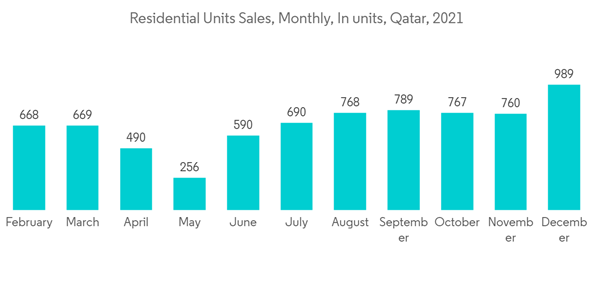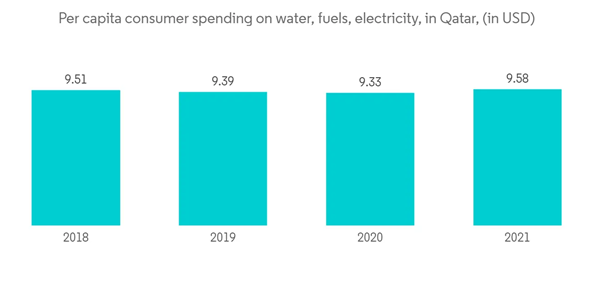Key Highlights
- COVID-19 negatively impacted the Qatari residential construction market. Many residential projects were delayed or canceled due to COVID-19.
- One of the most prosperous economies in the Middle East is Qatar. High GDP growth, population growth, job opportunities, and governmental regulations are all driving the country's residential construction market forward.
- Qatar is working on a wide range of infrastructure and industrial projects because it wants to host the Asian Games in 2030, is committed to its National Vision 2030, and has promised to host the 2022 FIFA World Cup. The current Emir, who has been in charge since July 2013, is putting the Second National Development Strategy into action to help the country's people.
- The high net worth of the average Qatari citizen and expat has a big effect on the building industry and makes more people want to live in luxurious, well-planned neighborhoods.
- In the medium- to long-term, it is expected that the rate of population growth will lead to more demand because there will always be more foreign workers than there are jobs. In response to the increased building activity in the industry, the Qatari government has recently made a number of changes to the law that are meant to protect the interests of people who invest in residential buildings.
- The housing project's construction was on schedule to be complete by the end of 2022. The project will also have 49 separate villas that can be bought as investments. Each villa has two floors, a basement, a penthouse, a private pool, and parking spots.
Qatar Residential Construction Market Trends
Qatar's Residential Market is Slightly Improving
The COVID-19 pandemic wreaked havoc on the country's economy and finances, and the residential market in Qatar is still weak. Residential property prices fell as a result of rising supply despite declining demand. In Q1 2021, 1,700 apartments and villas were constructed, bringing the total number of housing units to about 304,715 units.The four companies gave 1,650 units from project handovers in Fereej Abdul Aziz, The Pearl, Al Dafna, Mirqab Al Jadeed, and Lusail (Fox Hills and Marina District).
The average price of a residential property transaction was over $500 million, and it was growing at a rate of 3.4% per quarter and 6.8% per year. The number of housing transactions fell by 3.3% every quarter, but they were 52.8% higher than at the same time in 2020.
The most residential housing was sold in Umm Garn, and Fereej Al-Amir had the biggest ticket sizes overall. There were 68 residential building transactions. Most of the transactions happened in Old Airport and Umm Ghuwailina.
In the first two months of 2021, The Pearl and West Bay Lagoon saw annual declines in transaction volume and value of 6.8% and 11.7%, respectively. The average price per square meter for apartments in The Pearl was USD 4200.
During the quarter, contracts were given out to build 450 homes in Fox Hills, Fox Waterfront, and the Marina.6.300 units were kept in the pipeline for the remaining three quarters of 2021.
While the value of residential real estate sold climbed by 28% over the prior year in October 2021, the overall number of properties sold increased by 2.8%. 13,500 new residential units are anticipated to enter the Qatari market by the end of 2022.
This comes after the addition of 580 housing units in 2021's fourth quarter. Among the most recent constructions are 15 mixed-use structures in The Pearl, apartments and mixed-use structures in Qetifan North, 1,700 villas in Furjan Wadi Lusail, Al Yussum townhouses, 2 in Yasmeen City Lusail, and the Milos apartment complex in Legtafiya.
Due to the completion of new high-rise units, prices increased across a number of locations from H1 2020 to H1 2021, including Lusail City (from USD 3173 per sq m to USD 3400 per sq m) and West Bay (from USD 2900 per sq m to USD 3200 per sq m). Apartment investors are starting to favor Lusail more and more, and demand is increasing.
Qatar's residential rents are falling further as the occupancy rate is rising.
The country's hosting of a significant international event like the FIFA World Cup in 2022 has increased demand, which has made the rental market in Qatar more stable. The median monthly asking rent for residential properties decreased by 5.7% year over year and 1.8% quarter over quarter.In 2020, rents for apartments went down sharply, but rents for villas are still going down slowly. The median monthly asking rent for apartments was USD 1727, which was down 1.9% quarterly and 6% annually.
The largest quarterly rent decreases, of up to 5.3%, were observed in three-bedroom apartments. The largest quarterly rent reductions, ranging from 3.5% to 5%, were experienced in West Bay, Fereej Bin Mahmoud, and Al Mansoura.
The median monthly asking rent for villas was USD 2800, which was down 3.9% year over year and 1.2% quarter over quarter. Three-bedroom villa rents experienced the largest quarterly decline, falling as much as 2.8%. Between one quarter and the next, rentals in the Al Aziziya and Ain Khaled complexes decreased by an estimated 3.3%. The average monthly asking rent for one-, two-, and three-bedroom apartments at The Pearl was USD 2120, USD 3300, and USD 4100, respectively.
Even though prices have gone down because there are so many new homes, there is still a lot of demand for villa rentals in Qatar.Prices in Abu Hamour and Ain Khaled fell by USD 278 in the first half of 2021 compared to the same period in 2020, while those in Al Thumama decreased from USD 3548 to USD 3000.
However, in areas like Al Messila and Al Soudan where modern luxury flats are offered, median advertising prices have increased. Renters and property owners in areas like Al Muntazah, Al Wakair, and Al Muraikh may be the cause of price stagnation by providing "grace periods" and "free months" as incentives.
Qatar Residential Construction Industry Overview
There is huge competition between residential real estate companies in Qatar. A select few players control the market.The proportion of residential real estate properties sold through online channels has consistently grown, owing to rising internet penetration, growing demand, increasing personal disposable incomes, a surging middle-class youth population, and opportunities offered by government infrastructure investments.In the coming years, it is expected that there will be more foreign investment in Qatar's residential real estate market. This is because non-Qataris can invest in certain real estate projects, such as the West Bay Lagoon and The Pearl. Major real estate players in the market are Al Mana Real Estate, United Development Company, Qatari Diar Real Estate Company, Ezdan Holdings, and Barwa Real Estate Company.
Additional Benefits:
- The market estimate (ME) sheet in Excel format
- 3 months of analyst support
This product will be delivered within 2 business days.
Table of Contents
Companies Mentioned (Partial List)
A selection of companies mentioned in this report includes, but is not limited to:
- QD-SBG Construction
- Midmac Contracting Co. W.L.L.
- Hamad Bin Contracting Company
- Galfar Al Misnad Engineering & Contracting Co.
- Porr Construction Qatar W.L.L.
- Qatari Arabian Construction Company - QACC
- Q-MEP Contracting
- Al-Balagh Trading & Contracting Co.
- Ramco Trading & Contracting
- Alseal Contracting And Trading Company
- Bemco Contracting Company Qatar
- Al Majal International Trading And Contracting Company Wll
- Domopan Qatar W.L.
- Lupp International Qatar L.L.C










